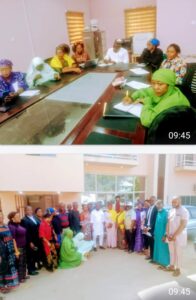

By Correspondent in Lokoja.

The United Nations Children’s Fund (UNICEF) and the Kogi State Primary Health Care Development Agency (KSPHCDA) have urged stakeholders to amplify awareness and support for the Big Catch-Up (BCU) vaccination initiative.
Our correspondent reports that this ambitious programme seeks to address immunization setbacks caused by the COVID-19 pandemic, aiming to safeguard millions of children from preventable diseases.
Amb. Dr. A.K. Hudu, UNICEF’s Social and Behavioral Change (SBC) and BCU Consultant, emphasized the importance of the initiative during a one-day stakeholders’ town hall meeting held in Lokoja on Friday.
He explained that the BCU aims to close vaccination gaps by targeting children who missed essential immunizations during the pandemic.
“By supporting BCU activities, we are not just restoring immunization progress; we are protecting children, reducing outbreak risks, and promoting overall community well-being,” Hudu stated.
Hudu,who stressed the role of Social and Behavioral Change in empowering communities, fostering positive actions, and encouraging stakeholder collaboration, called for increased government commitment to improving vaccination policies and services to enhance uptake.
In his remarks,Dr. Musa Muazu, Executive Director of the KSPHCDA, praised UNICEF and its partners for their consistent support in advancing universal health coverage in Kogi State.
He reaffirmed Governor Ahmed Ododo’s dedication to delivering quality healthcare, especially in rural areas, while urging health officials and local government leaders to actively drive BCU activities for maximum impact.
Contributing,Mr. Shittu Momoh, the State Health Educator, underscored the need for targeted messaging to dispel myths and misconceptions about vaccines.
“It is our collective responsibility to reassure communities of vaccine safety and effectiveness while promoting immunization as a lifesaving measure,” Momoh said.
He advocated for house-to-house and community mobilization, especially in hard-to-reach areas, to ensure every eligible child is vaccinated.
In her contribution,Mrs. Ajuma Apeh, the State Immunization Officer, outlined the campaign’s focus on children aged 12 to 59 months.
She added that the vaccination team would also address zero-dose children with antigens like BCG, OPV0, and HepB.
The campaign, scheduled for January 6–11, 2025, will cover seven local government areas, including Ankpa, Dekina, and Ibaji to close immunization gaps in underserved areas,strengthening health systems and restoring immunization progress.
The Reporters reports that traditional and religious leaders, NGOs, CSOs, and media representatives who attended the meeting commended UNICEF and its partners for their commitment to quality healthcare.
They pledged to intensify efforts in raising awareness through public events, interpersonal communication, and other channels.
Edited by Dada Ahmed.


